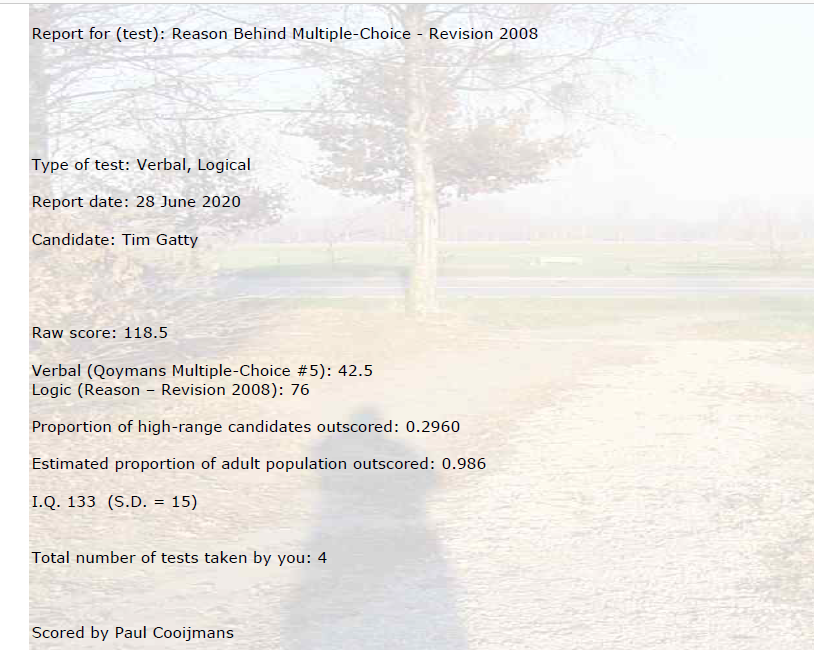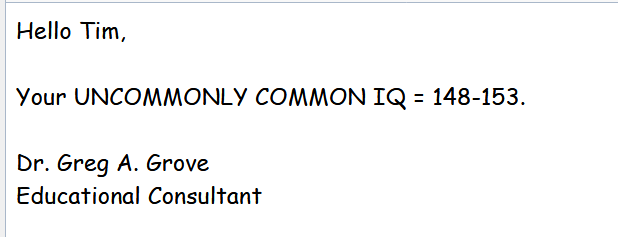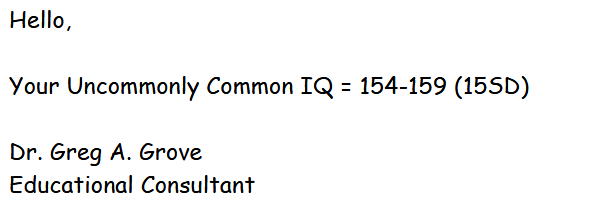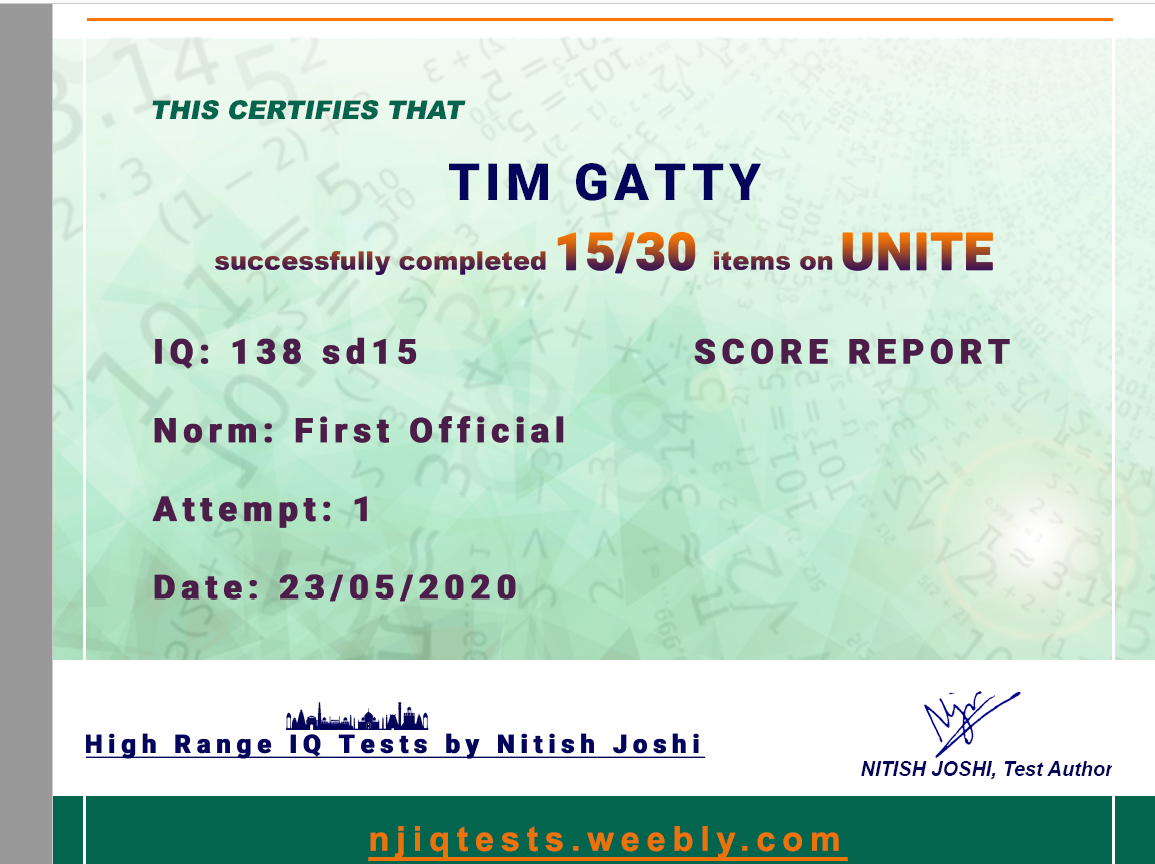High and low iq's?
auntblabby
Veteran

Joined: 12 Feb 2010
Gender: Male
Posts: 114,663
Location: the island of defective toy santas
It's very unlikely that any of them are worth much as IQ tests (although they might be fun as puzzles), but that depends on the theory behind them. I doubt the test makers seriously consider the theory.
IQ is a test score that has meaning only relative to other people's test scores, so, after a test is created, it has to be normed on a large, diverse cross-section of the population the test is intended for. These lone internet test creators don't have the resources to norm their tests. You could get every test question correct, but that would be meaningless by itself. If lots of other people can correctly answer every question, you're average. If almost no one else can do it, you're far above average. If only adults or college-educated people can answer half the questions at all, the test has extremely limited applicability and may be invalid. There's no way to know these things without norming.
I don't see how an IQ test can be designed specifically for people in the high IQ range. How would anyone know what kind of test material accurately identifies and challenges high IQ people before creating a test for them? You'd have to identify people who'd scored highly on some other IQ test or at least on some kind of achievement test.
But in order to match scores like this, both the previous IQ test and the high-IQ test would have to be very similar. Most high IQ tests, for example, have no perceptual (visual) intelligence questions, whereas the WAIS, the most widely used IQ test in the U.S., is roughly 1/4 perceptual reasoning material. So WAIS scores, Raven's Matrices scores, etc. cannot be compared to scores on high-IQ tests, and that eliminates one way to identify who has a high IQ.
The only thing the high-IQ test takers can compare their scores to are the scores of the few dozen or few hundred people who bother taking the same high-IQ test. That's all. So the scores on high-IQ tests don't really mean much. The most recent version of the WAIS, in contrast, was normed on over two thousand people, and more and more people take it as psychologists administer it to their clients, providing a data bank of information about the test that facilitates test improvement over time.
Since the prevailing concept of intelligence in the U.S. psychology community includes several components that are not on high-IQ tests at all, high-IQ tests are not only measuring something different than what traditional IQ tests are measuring, they're also based (implicitly or explicitly) on a different and more limited concept of intelligence. That's not necessarily bad as long as the test creator knows this and intends this, and the test takers know it as well. Do they? I doubt it.
They will also tend to exacerbate things like the gap in subtest scores that autistic people tend to get. Imagine an autistic person who's gifted in working memory but borderline intellectually disabled on the verbal domain taking a high-iq test that completely omits any working memory content. Do the high-IQ tests split up questions into different domains, do they include any nuance that differentiates between a globally low-IQ person and someone who maybe just has a learning disability in one area despite being generally very smart? Not that I've seen.
Since the high-IQ tests have no purpose other than to determine who is "smart," the test content is based on little more than the whims of the test creator. That's fine if someone just wants to solve someone else's puzzles. The content of real IQ tests, in contrast, is based on decades of research undertaken to make sure that IQ tests actually measure something meaningful in specific contexts: clinical psychology, education, disability determination services, etc.
IQs are so odd because if you have DRASTICALLY varying scores, they cannot give you a true result.... i think it's ethically and scientifically unviable...
for example my VERBAL IQ was extremely above average near the highest score, but everything else was normal or just below normal...
then executive functioning being well below average-
that made things difficult to estimate, too.
so they said the verbal iq shot my score up too much, so it was not possible to say any iq level.
these are people who spent 3 days over 3 weeks having me do tests, quizzes, logic things, etc.
it wasn't just an internet quiz- it was really intensive, as part of my ASD diagnosis.
i bet the same is the case for many people here...
_________________
Take defeat as an urge to greater effort.
-Napoleon Hill
ReapTheWhirlwind
Blue Jay

Joined: 9 Sep 2019
Age: 22
Gender: Male
Posts: 79
Location: Central Pennsylvania
That assumption doesn't make the tests inaccurate; it just means that the scores of test-takers who lack that education are unreliable.
I'm not so sure about that...I think the internationally administered IQ tests tend to be the "culture-fair" IQ tests, which rely very little on education. Of course they are not completely culturally neutral, but they are much more so than, say, the Wechsler.
The IQ test is not meant for third world countries. The majority of world averages for third world countries are a result of bad testing. Even so, the baseline 100 IQ has never been a constant since its inception. It changes based on the average performance for WESTERN nations. It is not a reliable score if all previous generations would score low enough to be classified as ret*d, and nearly all sub saharan countries score very low (even on charts that try to be impartial), so low that some wonder how their countries function if everybody is borderline ret*d. And even now, scores for individuals vary tremendously, which is an indication that overall, IQ tests are absurdly outdated and cannot be an effective measure of "intelligence."
_________________
"Stop quoting me"
-Issac Einstein (1453)
https://www.smartkidswithld.org/first-s ... st-scores/
There are IQ tests that are meant to be administered internationally. They are not the same tests that are administered by psychologists, so that may be why you don't know about them.
I don't know what IQ test you are talking about, but the Wechsler is updated to account for the population-wide increase in IQ (which is called the Flynn effect). It's not the same test people took in previous generations, and the scale of scores is not the same. The scale is based on the most recent norming of the test.
The fact that large numbers of people from previous generations would score very low is not evidence that the scores are reliable. Test performance is partially based on education, and many people from previous generations did not have as much schooling as we do today (they worked on farms their whole life). Very few people went to college back then, whereas a large proportion of people go to college nowadays. Educational toys, public libraries, and the Internet were not available. Malnutrition (which increases the chances of impaired intelligence) was more common. People today actually are smarter than people were back then.
Which test(s) have scores that vary tremendously?
It's perfectly fine. In the context of most neuropsychological evaluations, scores are not very important. What's important is understanding the pattern of the client's cognitive skills. Psychologists definitely want to know if someone has both very high and very low scores. That could be a sign of a learning disability. So it's a good thing that the test is structured this way even though a score cannot be provided.
IQ tests are based on the majority's pattern of intelligence, which means having roughly equal skills in all areas. People who don't fit that pattern stand out, and standing out helps them get the proper diagnoses.
In the high range community, tests are generally divided into spatial, numerical, and verbal tests. So you would take different tests to get a sense for these abilities and then combine to get a sense for FSIQ. The goal of all tests in constructing a norm is to correlate with supervised tests to make up for their lack of stats. Independent test designers aren't taking responsibility for measuring someone's intelligence the way psychologists are, but they're at least putting some effort in for correlations (they're doing what they can given their lack of sample size). These are tests mainly created for fun -- but they have the added benefit of giving you an estimate of your IQ. Many of the test authors are indeed intelligent and have the knowledge required to correlate their norm with supervised test scores, and will do so. IQ is just an estimate anyway, even on supervised tests (and surely you can see it must be limited as well, despite all of the research and marketing behind it). Often the independent tests are quite different from the supervised variety, and measure different cognitive abilities, especially when they are untimed. Untimed tests are the only way to measure someone's ability on hard items, and you simply won't find these kinds of items on a supervised test.
This is theoretically one way to measure the absolute highest IQs in the world. Also, when designed well, these tests have little to no cultural bias. There is no advanced knowledge needed. Resources such as internet can be used to look up words not in the vocabulary. Time can be taken to research concepts if needed. Calculator can be used to help with arithmetic. What they measure is mainly logic and pattern recognition. So in this sense, they can be very pure tests, free of culture, politics, and often commercial motives. I've been a test author myself, though I'll be one of the first to admit these are experimental tests. I'm not a great salesperson, but some people actually make a job/career out of doing this, and they really do a great job with the stats, research, etc. The correlations are there. Statistical analyses like Cronbach's alpha and correlations with WAIS are given. People tend to score similarly on supervised as they do on independent, depending on the test and the testee. Of course some tests are poorly designed, but I'm trying to vouch for the good ones. There's a fairly large community of test authors and testees out there contrary to your claims and views. There's something to be said for what they can measure, that proctored tests cannot.
iq is not in your control . I would just leave it there. Unless you are curious. I suppose people with autism film acceptance via being really good at something. They tend to have higher iqs. Low iq will make it harder. For anyone. Granted too high and you will notice a similar increase in Difficulty fitting in. I’ve tried to lower my intelligence to no avail thru self medication. I have accepted my ridiculous iq and made peace with it. Also, I’m incredibly handsome. And white. But I’m also left handed so I would say my intersectionality score still outperforms a black female. Sorry, I stopped being serious at some point in this exchange.
It's perfectly fine. In the context of most neuropsychological evaluations, scores are not very important. What's important is understanding the pattern of the client's cognitive skills. Psychologists definitely want to know if someone has both very high and very low scores. That could be a sign of a learning disability. So it's a good thing that the test is structured this way even though a score cannot be provided.
IQ tests are based on the majority's pattern of intelligence, which means having roughly equal skills in all areas. People who don't fit that pattern stand out, and standing out helps them get the proper diagnoses.
You misunderstood
me.. I meant that, to say a score with certainty when scores vary in the way mine did in different areas, is ethically wrong for them as it isn't an accurate reflection of one's abilities.
I meant that is the reason they don't do it.
Im not saying it is scientifically or ethically wrong not to give a score- am saying the opposite
_________________
Take defeat as an urge to greater effort.
-Napoleon Hill
Dear_one
Veteran

Joined: 2 Feb 2008
Age: 76
Gender: Male
Posts: 5,721
Location: Where the Great Plains meet the Northern Pines
This is theoretically one way to measure the absolute highest IQs in the world. Also, when designed well, these tests have little to no cultural bias. There is no advanced knowledge needed. Resources such as internet can be used to look up words not in the vocabulary. Time can be taken to research concepts if needed. Calculator can be used to help with arithmetic. What they measure is mainly logic and pattern recognition. So in this sense, they can be very pure tests, free of culture, politics, and often commercial motives. I've been a test author myself, though I'll be one of the first to admit these are experimental tests. I'm not a great salesperson, but some people actually make a job/career out of doing this, and they really do a great job with the stats, research, etc. The correlations are there. Statistical analyses like Cronbach's alpha and correlations with WAIS are given. People tend to score similarly on supervised as they do on independent, depending on the test and the testee. Of course some tests are poorly designed, but I'm trying to vouch for the good ones. There's a fairly large community of test authors and testees out there contrary to your claims and views. There's something to be said for what they can measure, that proctored tests cannot.
I messed this one up through thinking I would lose the multiple choice(general knowledge) part if I stopped and started again the next day. Hence I rushed through it.

Best attempt .
.jpg)
Another good one. 1st and 2nd attempt .


Those are good scores, Tim! I say keep going to further reveal more about your potential.
The reason I say this is because those scores are not robust in and of themselves, though they are enough to show you're a really smart guy.
Nick I would just flat out not trust (he has ruined his reputation imo). I'd say take another test by another author.
Greg I'm so-so on. I don't particularly like or trust him but he seems like a decent enough guy, I don't have anything unfair against him.
Paul you have to take your time. His tests are a bit eccentric but good, and his norms are pretty good at the end of the day, though they change over time (as one might expect).
Aha! And then fr thoseof uswho suck at both (but easier to work at EQ by reading books n intentionally watching interviews documentaries etc as well as having conversations to understand all kinds of ppl and their reasons /feelings
Charles Dickens is the best author of fiction to understand many kinds of ppl and absorb it by sublimation while enjoying a story too.. N very thought-provoking n deep ...but not with a colourless set of characters
_________________
Take defeat as an urge to greater effort.
-Napoleon Hill
| Similar Topics | |
|---|---|
| Failing as a high IQ kid |
23 Feb 2025, 5:19 pm |
| Former high school crush returns |
19 Dec 2024, 9:11 am |







_TEST_IQ_Haven_b.PNG)


